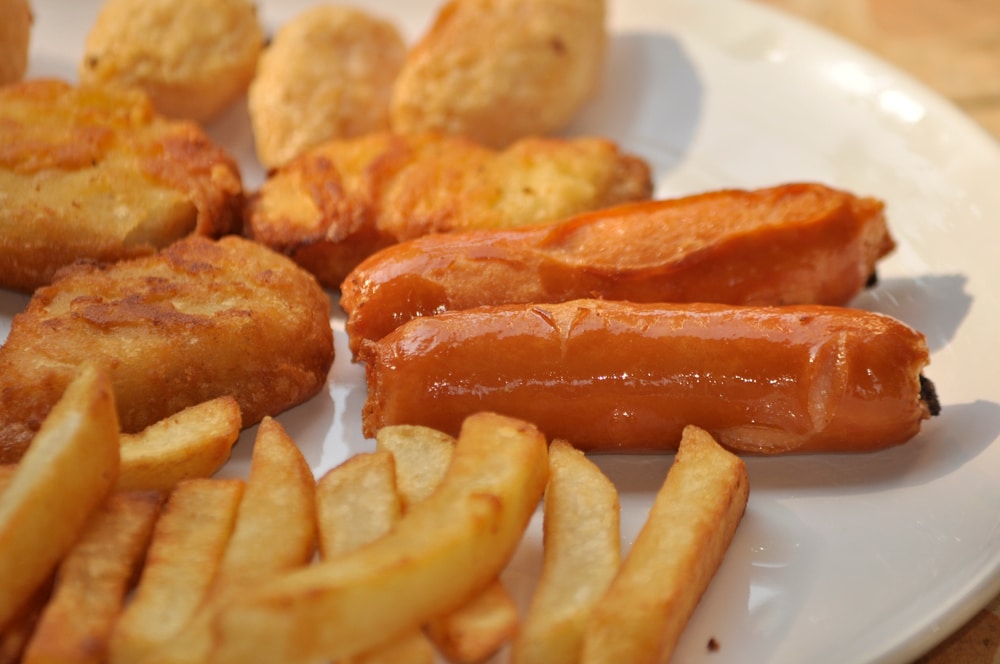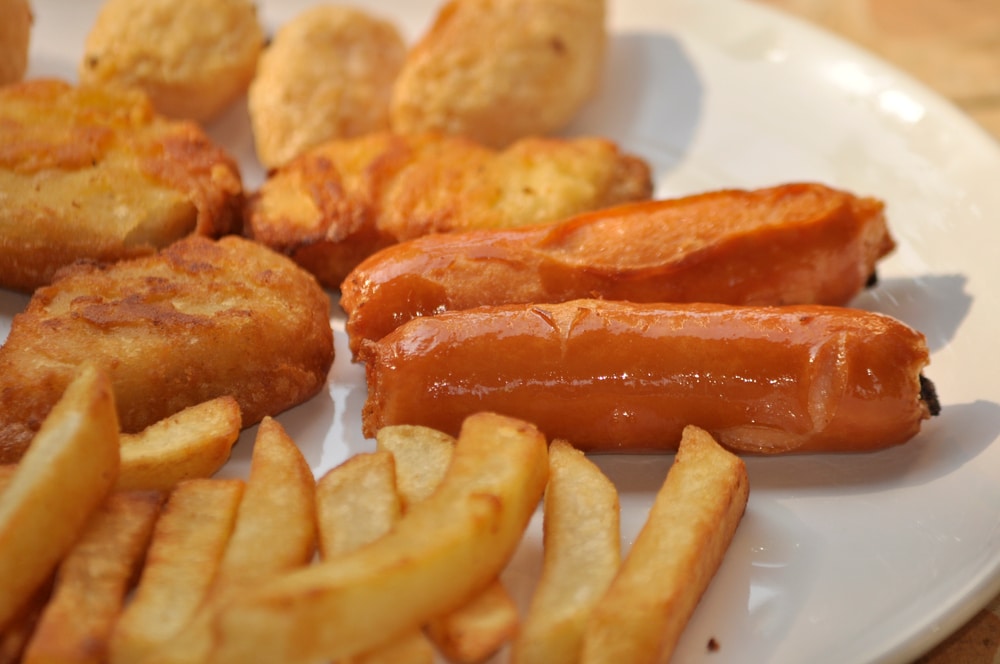Taking care of a dog also means providing a healthy diet and maintaining nutritious meals, exercise, and entertainment. And, as we know, dogs can eat a lot of things, but can dogs eat processed food too?
A dog cannot effectively digest typical human and processed food since it is too rich and fatty. Doing so might result in vomiting and diarrhea, and it won’t be the most nutritious choice for them either. It is best for dogs to eat specialized dog foods and unprocessed veggies.
Table of Contents
What Is Processed Food?

A bewildering variety of alternatives that each claim to be the greatest dog food on the market are offered to dog owners. Finding dog food that is nutritious, priced reasonably, appealing, and tasty to your dog can be difficult.
Almost all of the low-priced and easier-to-handle foods are processed, not just microwaveable meals and prepackaged meals.
Processing food can be as simple as drying, baking, canning, and freezing. These are processes that change the food’s chemical composition, therefore significantly reducing its nutritional content.
Find Food That Fits Your Pet’s Needs
It can be overwhelming for pet owners to quickly browse the pet store’s food aisles. Numerous varieties of dog food are available everywhere. What factors do you take into account when selecting the finest option for your beloved furry friends?
All dogs, whether they are puppies or seniors, require the right nourishment for their developmental stage. Until they are 7 to 8 weeks old, puppies normally take in their mother’s milk.
Around 3 or 4 weeks, you can start introducing small portions of puppy food, until they are one year old. Also, pregnant dogs require a high-calorie diet.
Older dogs need to be able to digest food easily, so food for them needs to reflect that.
Large-breed dogs, such as Samoyeds, may require dog food with distinct nutrient balances that support musculoskeletal health.
The Importance Of Choosing The Best Dog Food
It is important to know what your pet needs in order to keep it healthy and active. It is vital to give your dogs high-quality pet food if you want them to live a long and healthy life.
Water, proteins, healthy fats, carbs, vitamins, and minerals are essential for your dog’s health.
Your dog’s hair coat will remain smooth and shiny if you feed it well. Doing this will strengthen its immune system. It will maintain the health of his digestive system. Their welfare, weight, energy level, and muscular health are all impacted by the food you allow them to eat.
Choosing the healthiest pet food can not only maintain your canine buddy in the greatest condition possible, but it may also prevent serious future medical difficulties.
Why Is Processed Food So Bad for Dogs?
Not every processed food is unhealthy, for humans, but most of them contain high levels of sugar, fat, and salt. This is unhealthy for our canine friends.
Not only that, but processed food is very challenging for a dog to digest. The pancreas must work harder and release additional enzymes.
Due to the high salt and fat content, processed meat like salami is not a healthy snack for dogs and shouldn’t be given as a regular treat.
Processed dog food can contain fillers and inferior ingredients. These could include derivatives made using grains of inferior grade and animal byproducts.
One of the key components of processed foods is grain. It costs nothing and adds “bulk” to the food and lowers the nutritional value.
The market for canine and working animal food is enormous and has grown significantly in recent years. It is not, however, subject to the same strict regulations as human foods.
If your dog consumes an improper and unhealthy processed food-based diet, several aspects of their health, including their teeth, coat, energy levels, digestive systems, and even mental health, may suffer.
Long-term use of unhealthy processed food for your dog raises their likelihood of developing long-term medical disorders in addition to deteriorating their overall physiological health.
Weight Gain
Dog obesity is a significant issue in the veterinary field and has been associated with a variety of health issues in canines. Many pet owners unintentionally overfeed their animals, so it’s crucial to take your dog in for frequent examinations and discuss portion sizes with your veterinarian.
How much a dog needs to eat can depend on a variety of circumstances, including activity level, season, breastfeeding, illness, and more. If they need to lose or gain weight to reach their optimum size, you’ll need to feed them for their target weight, which may not be the same as their present weight.
To ensure they are eating the proper amount each day and to make sure they aren’t receiving additional food from other family members, it is a good idea to weigh out their meals each day.
Foods You Shouldn’t Feed Your Dogs
Dogs can be opportunistic, especially when it comes to grabbing and eating delicious food. Not all common foods and drinks are safe and good for them to consume.
Some foods go way beyond not being good and are toxic for our dogs. Some of them are onion and garlic, corn, avocado, grapes, cooked bones, artificial sweetener xylitol, milk, sugary foods, caffeine, chocolate, and others.
Other foods may not initially be toxic or cause an illness, but are nutritionally poor and lack value.
Healthy Diet And Treats
Domestic dogs can obtain nutrition from other foods, even though meat makes up most of their diet. Cereals, fruits, and vegetables, in addition to meat, can make up a good dog diet. These foods can be a valuable source of fiber, vitamins, and minerals in addition to serving as fillers.
It can be tempting to assume that giving your dog delightful treats will demonstrate how much you care about them. Similar to us, it’s okay to give your dog the occasional healthy treat, but giving them too many could make them gain weight.
If you do choose to sometimes reward your dog with a treat, be sure it doesn’t account for more than 10% of their daily food intake. You can account for this by reducing their daily food intake by 10% and storing the extra for treats.
Apples, green peas, beans, bananas, broccoli, sweet potatoes, watermelon, and carrots are some of the healthy snacks that you can treat your fluffy companion with.
In Conclusion: Can Dogs Eat Processed Food?
Can dogs eat processed food? As we previously stated, processed food is tougher to digest and requires more enzymes and energy. These, as said, are not the best because of their nutritional value and dogs should not consume them regularly.
So, with all that said, does your dog have a favorite food? Or maybe a favorite “guilty pleasure” treat? Share it with us!
